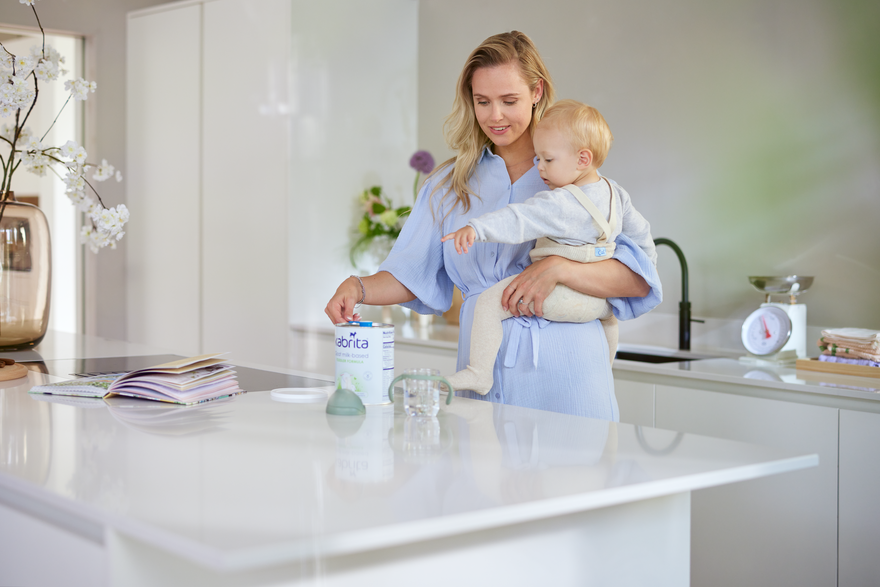Baby formula safety: do's and don'ts

Baby formula is safe and nutritious, but it's important to handle and prepare it properly to avoid the risks of foodborne illness. This guide will help you become a pro at preparing and using infant formula while helping to keep your baby healthy and safe.
Select the right baby formula
The first step is to choose the appropriate infant formula. Formulas can be very different in terms of ingredients and other standards like whether it is organic or non-GMO. If your baby struggles with cow milk sensitivity or digestive issues, goat milk-based formula may be a great option!
It may feel challenging to understand all the ingredients in a formula at first glance, but your pediatrician can help you select a formula that meets your baby's specific dietary needs.
Practice proper hand hygiene
It goes without saying, but maintaining good hand hygiene is essential when handling baby formula. Always wash your hands thoroughly with soap and water before preparing formula or feeding your baby. Also, make sure to disinfect the surface you’re working on. This precaution helps prevent the transmission of germs that could potentially lead to infections or digestive issues in your baby.
Sterilize equipment
Before using any feeding equipment such as bottles, nipples, or utensils, make sure they are properly sterilized. Sterilization helps eliminate harmful bacteria that could affect your baby's health. You can sterilize equipment using boiling water, steam sterilizers, or microwave sterilization bags according to the manufacturer's instructions.
Prepare formula safely
Properly preparing baby formula is critical to ensure your baby receives the correct nutrition and to prevent bacterial growth.
Follow these steps for safe formula preparation:
- Wash and sterilize bottles and nipples before use.
- Use safe drinking water. If you are concerned about the safety of your water, boil water for one minute, then let it cool before mixing with formula.
- Always measure the water first and then add the powder, according to the formula can’s instructions.
- Only use the scoop provided with the formula container.
- Never heat up baby formula in the microwave. If your baby prefers warm formula, run the filled bottle under warm water, or place it in a bowl of warm water.
- Test the temperature of the formula on your wrist before feeding. It should be lukewarm, not hot.
- Don’t add anything extra like cereal or baby food to your baby’s bottle unless specifically advised by your pediatrician.
- Shake or mix the formula thoroughly to ensure consistent nutrition in each feeding.
Throw away leftover formula
To prevent potential contamination and ensure your baby's safety, it's important to discard any leftover formula after a feeding. Even if your baby only drank half the bottle, it must be thrown away. Also, be sure to dispose of any formula that has been left out.
Bacteria can multiply rapidly in formula that has been sitting out at room temperature for an extended period. If you're not sure whether a container or bottle of formula is safe, always play it safe and throw it out.
Store your formula properly
Store unopened formula containers in a cool, dry, indoor place. Once the container has been opened, store in a cool, dry place with the lid tightly closed. Do not store it in the refrigerator.
Check the label on your container to find out when the formula must be used by — usually this is within 1 month of opening. Once you open the container, write the date on the lid to help you remember. Never use formula after the “Use By” date on the container.
You can prepare formula ahead of time, just be sure to store it in the refrigerator at or below 40°F (4°C) and use it within 24 hours.
Don’t make homemade formula
While homemade baby formula may seem like an all-natural approach to feeding, it does not meet the safety standards of commercially available formula. Online formula recipes may look healthy but getting too little — or too much — of important nutrients can cause serious problems for babies.
Keep formula safe while traveling
When traveling with formula, plan ahead to ensure your baby's safety and comfort. Carry pre-measured formula powder in a clean, dry container. Pack sterilized bottles and nipples separately. If you need to mix formula on the go, use safe drinking water or boiled water that has cooled
Become a baby formula pro
Ensuring your baby's safety and well-being is a top priority for every parent. By following these essential baby formula safety tips, you can provide your little one with proper nourishment while minimizing the risk of infections and digestive issues.
The good news is that safely preparing baby formula will soon become second nature and you can feel less stressed about feeding your baby.